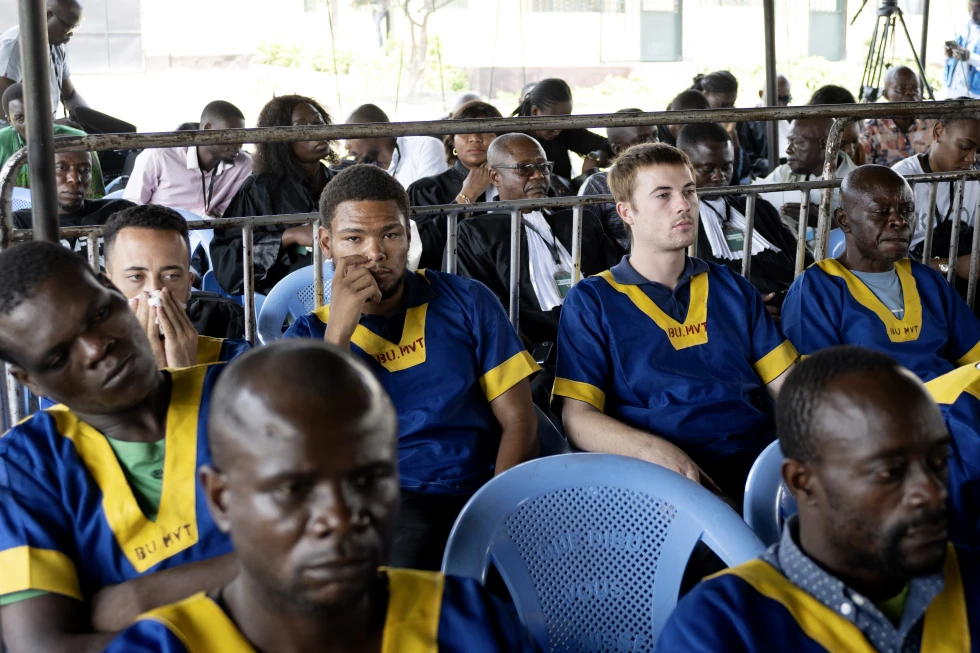HARARE – The High Court has dismissed an application filed by jailed business partners Mike Chimombe and Moses Mpofu who were seeking the court’s approval to refer their case to the Constitutional Court.
The controversial entrepreneurs have been languishing in remand prison since their June arrest over a US$7 million goat tender scandal.
Their numerous attempts to seek bail have all hit a brick wall.
Justice Pisirayi Kwenda found that the two were not genuinely seeking Constitutional Court intervention but were only trying to block their prosecution.
The two were complaining that there was interference by top Zimbabwe Anti-Corruption Commission (Zacc) official Michael Reza which resulted in them being denied bail despite the fact that the prosecutor general had initially consented to their prayer.
They also complained about the ages of the court assessors in their case..
Mpofu and Chimombe, through their lawyers, argued that the law says age limit for High Court judges is 70 yet the assessors who were sitting with Kwenda were beyond that age.
The defence, led by Lovemore Madhuku, argued that because of their advanced ages, the assessors were likely going to fall asleep during court proceedings, thereby jeopardising the fairness of justice.
But in his ruling, Justice Kwenda frowned upon the arguments put to his court by the two business partners, dismissing them as “ageism”.
“That was discrimination against elderly individuals,” Kwenda said.
“The claim was not supported by any research, scientific evidence, or substantive knowledge about the assessors involved in this case.
“There was no proof that their age affects their capacity to perform.”
The judge pointed out that the assessors were appointed based on their expertise, and the notion that assessors must possess the same qualifications as judges was unconvincing to him.
“Assessors need only possess certain specialised attributes,” Kwenda said, adding, that the age limit for assessors, initially set at 65, was increased to 70, reflecting a positive evolution in Zimbabwe’s constitutional framework, contrary to the lawyers’ arguments.
He stressed that the defendants should have formally addressed their concerns regarding the assessors’ age to the registrar, who could have appointed younger assessors if necessary.
“They are not genuinely contesting the appointment of the assessors; instead, they are challenging their trial,” he noted.
The judge also said the constitutional issues arose at the lower court, not before him.
“The issue was before the magistrate when the bail application was made in the magistrates’ court.
“Understandably, the issue did not arise when the matter was brought before the judge as bail appeal.
“I agree with the state that raising the issue is an opportunistic way by the accused.
“Now, with regards to the application for bail pending trial that was made before this court, it shows the two had an opportunity to challenge the law, but they did not do so. Timing is important.
“I therefore find that issues which relates to their appearance in the magistrates’ court, withdrawal of bail consent are frivolous and vexatious because the court cannot do anything about it now. It’s in the past,” he ruled.
On the issue of interference of ZACC, Kwenda said it is common for prosecution to change position on bail consent.
Kwenda said that should have been put to the magistrates’ without burdening his court with the matter.
Kwenda said despite the assertion by the accused that they are not contesting the involvement of his assessors in this trial, he feels that they don’t like him.
“I cannot ignore the fact the assessors have been challenged and in my view they should step down,” he said.
Madhuku said they are not personalising the issue.
“I therefore dismiss the application for referral based on these considerations,” he ruled.
Case returns to court on10 February next year and will run on a continuous roll.
















